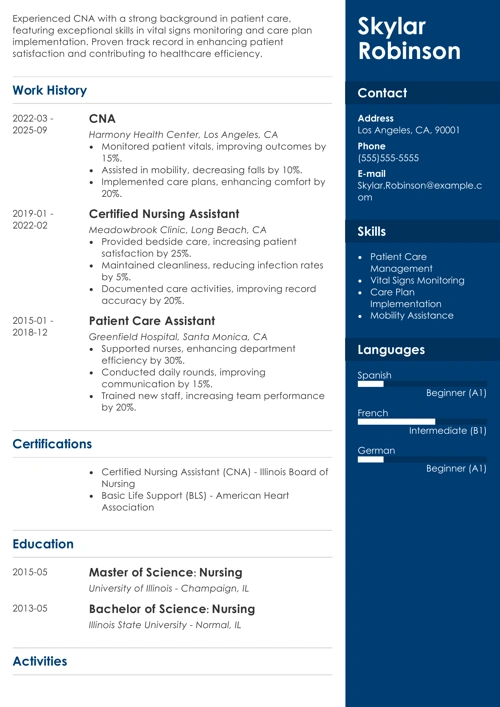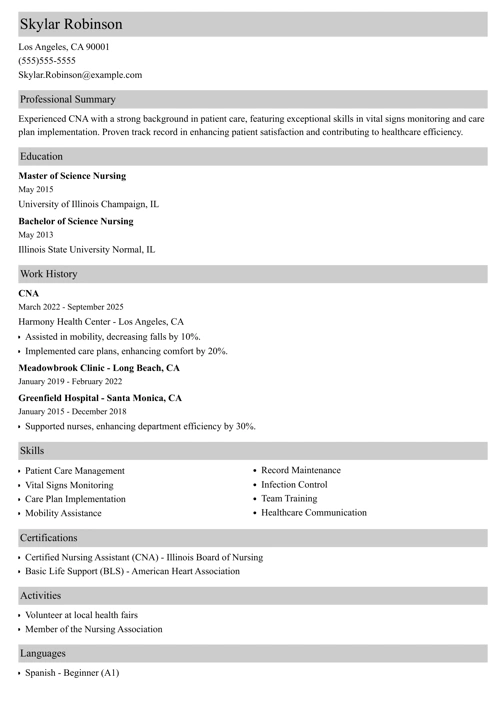Wondering how to answer the "What are your strengths and weaknesses?" interview question? Read on, and discussing your strengths and weaknesses will become your favorite part of any job interview.
Find out how to identify what your greatest strength is and comfortably talk not only about your strongest points but also your weaknesses.
This article will show you:
- How to answer the "What are your strengths and weaknesses" interview question?
- What the recruiter wants to know when they ask about your greatest strengths and weaknesses in an interview.
- How to identify your best weaknesses and strengths for job interviews.
- Lists of strengths and weaknesses for job interviews.
- How not to talk about your strengths and weaknesses during a job interview.
Want to save time and have your resume ready in 5 minutes? Try our resume builder. It’s fast and easy to use. Plus, you’ll get ready-made content to add with one click. See 20+ resume templates and create your resume here.
Sample resume made with our builder—See more resume examples here.
One of our users, Brittanya, had this to say:
Zety really helped me create the best resume possible. It pointed out how things could be better on my existing resume and suggested many things to be re-worded or removed.
After analyzing 11 million resumes created with our builder, we’ve gathered valuable insights from a diverse range of users across different industries and experience levels. Here are our top findings to help you create a more effective resume:
Data-Backed Insights From Actual Resumes
- 57.84% of resumes created in our builder exceed 300 words, 28.23% range between 101 and 300 words, and 5.35% are under 100 words.
- 3.59% of our users have no work experience, while 28.86% report having less than 3 years of work experience.
- The average number of skills listed on resumes is 12.56.
- The average number of jobs listed per resume is 2.61.
Preparing for an interview? Here's a bunch of articles that will help:
- 50+ Best Job Interview Tips & Tricks
- What to Bring to an Interview
- What to Wear to a Job Interview
- Common and Difficult Job Interview Questions
- How to Answer the "Why Should We Hire You?" Interview Question
- Popular Second Interview Questions & How to Answer
- How to Write a Thank You Email After an Interview [Examples]
Read on to learn how to talk about your strengths and weaknesses the right way:
Why Do Interviewers Ask About Your Strengths and Weaknesses
The recruiters ask this question to gauge your self-assessment skills and see if you’re a good fit for the role. They may also be looking to find out if you’re a person who actively works on their self-improvement. Asking about your strengths and weaknesses can also tell the hiring manager a lot about your work style and personality. The answer the interviewer is looking for is both self-awareness and confidence.
Here are a few other aspects of why it’s important to be prepared for that question:
- Your greatest strength happens to be the professional skill you need to do the job.
- Your greatest strength sets you apart from other candidates.
- You show off your communication skills when you provide the answer.
What Are Your Strengths Interview Question Alternatives
Remember that the recruiter can ask about your strengths or weaknesses using slightly different wording. Here’s a list of alternative versions of the "What are your strengths" question:
- What is your greatest strength?
- What is your biggest strength?
- What strengths would you bring to our company?
- What are three strengths that you bring to this position?
- What are your greatest professional strengths?
- What is your greatest accomplishment or the project you’re most proud of completing?
- What do you do best in your current position?
- What would your co-workers say is your strongest area of expertise?
Keep in mind that the recruiter can use similar techniques to ask about your greatest weaknesses. Notice that some of the questions asked in an interview can refer to your “current job responsibilities.” Make sure to prepare a couple of examples of recent successes.
Pro Tip: Prepare for potential follow-up questions such as: Can you explain how you’ve used that strength to achieve results in your current position?
How to Answer the “What Are Your Strengths” Interview Question
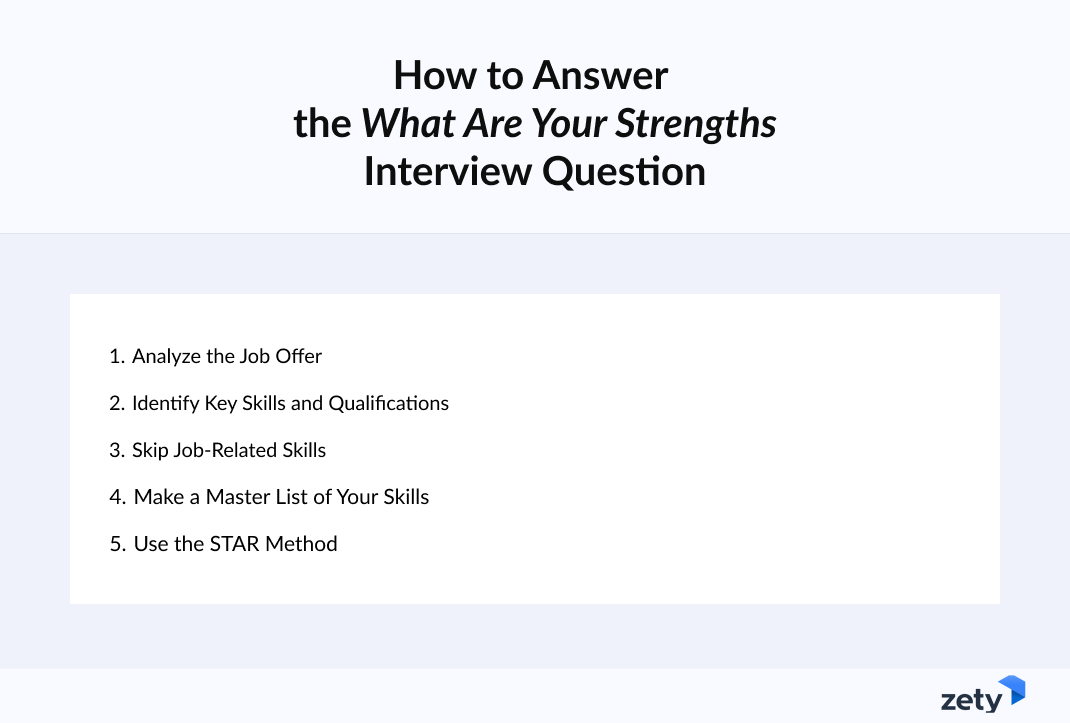 Here are five easy steps you should follow to answer the "What are your strengths" question:
Here are five easy steps you should follow to answer the "What are your strengths" question:
1. Start by Analyzing the Job Offer
Strengths are work-related skills that you need to do the job. So, the best place to start (as always) is your job offer. Underline or highlight all the skills and key qualifications that you see listed.
Here’s an example of a job offer for an Administrative Assistant. Notice that adaptive skills are pink and transferable skills are blue.
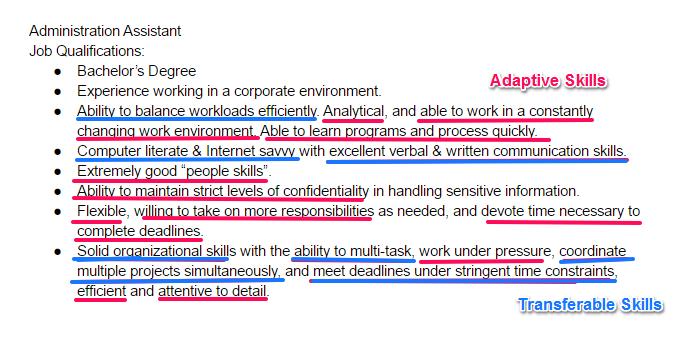
2. Identify Key Skills and Qualifications
What are your work-related skills? Are they hard skills? Soft skills? There is quite a difference between hard skills vs. soft skills. But ask yourself a more pointed question—?
You can do three things to find out which skills and qualifications are the most important:
- Have a look at a few other job offers for similar positions. Are any of the skills and qualifications repeated?
- Look up professionals with the same titles on LinkedIn. What do they list as skills and qualifications on their profiles?
- Focus on adaptive and transferable skills.
We reviewed 11 million resumes generated with our builder and identified the top 10 most commonly listed skills:
- Teamwork and Collaboration
- Problem-solving
- Excellent Communication
- Multitasking
- Attention to Detail
- MS Office
- Analytical and Critical Thinking
- Data Entry
- Project Management
- Team Management
3. Skip Job-Related Skills
Job-related skills are those you need to do a job. For example, programmers need to know programming languages such as Java and Python. Truck drivers need to drive. You get the idea. You won’t want to answer the "What are your strengths" question with a job-related skill as it’s obvious that you have it. Take a look at the answer samples for an administrative assistant.
What Is Your Greatest Strength: Example Answer
| RIGHT |
|---|
| My greatest strength is my written communication skills. |
| WRONG |
|---|
| My greatest strength is administering assistance. |
See, transferable skills (those in blue) are things you can use at any job in any industry. A good example from our job offer is excellent written communication skills or management skills.
Pro Tip: Writing is a desirable skill for almost any job. If writing is one of your strengths, you might want to choose it as an answer to the "What are your strengths" question.
4. Make a Master List of Your Skills
Did you make a master list of skills for your resume? You can reuse it. Look at the list of your skills versus those from the job offer. Which five are your strongest skills? Once you’ve chosen your strongest skills, think of a time that you used that skill for your job.
Ask yourself:
- Did your strength earn the company money?
- Did your strength save the company money?
- Did a supervisor ever pat you on the back because of your strengths?
- Did you ever get an award outside or inside your company?
Think of a success story for each strength to illustrate your impact when using those skills. "What are your strengths?" example answers should always include proof.
Read more and make sure you truly know How to Put Your Strengths on a Resume
5. Use the STAR Method
Finally, write out each success story using the STAR method. The STAR method helps you remember how to talk about your work accomplishments.
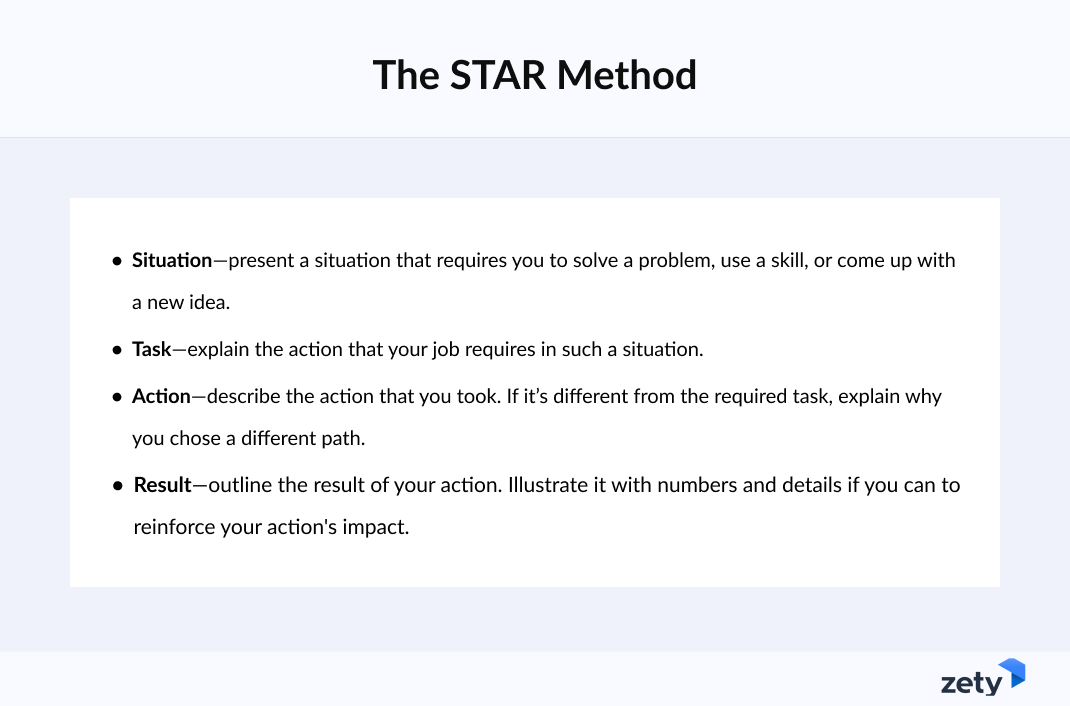
STAR stands for Situation, Task, Action, Result:
Situation—present a situation that requires you to solve a problem, use a skill, or come up with a new idea.
Task—explain the action that your job requires in such a situation.
Action—describe the action that you took. If it’s different from the required task, explain why you chose a different path.
Result—outline the result of your action. Illustrate it with numbers and details if you can to reinforce your action's impact.
Let’s take one of the adaptive skills from the Admin Assistant job offer:
What are your strengths?
- Ability to multitask in a constantly changing environment.
Situation—Over a six-month period, I had to assist ABC company in two major reorganization projects. First, the company went through a merger. Next, we moved our headquarters across town.
Task—My role during the merger was to reorganize the filing system. The new filing system had to be in place before we moved. Second, I spearheaded the move to the new headquarters. My responsibilities included packing up the office and coordinating with the movers. I also had to keep everything within budget.
Action—I had to learn the new process quickly and work under pressure according to tight deadlines. So, I dedicated time after hours to learn the new system. I watched online tutorials and read the manuals front to back. I paid close attention to details. For the move, I chose a moving company that had helped other companies in our building move. The company had also worked with me in my previous role and offered a discount.
Result—The time I dedicated to learning the new filing process paid off in the end. It took me half the time expected to put the new system in place. That allowed me to focus on moving the office. I became an expert in the new filing system, and my supervisor chose me to teach the process to everyone else. My choice of moving company also made the transition to the new office smooth.
Pro Tip: Some skills and traits are considered useful across all industries. Take a look at the top skills employers look for and the top traits and qualities employers look for to find out more.
Making a resume with our builder is incredibly simple. Follow our step-by-step guide, use ready-made content tailored to your job and have a resume ready in minutes.
When you’re done, Zety’s resume builder will score your resume and our ATS resume checker will tell you exactly how to make it better.
What Is Your Strength—Best Answer Examples
The interviewer can follow up the "What are your strengths" question by asking for more examples of strengths.
Here’s an example of a second strength for the same candidate.
| RIGHT |
|---|
|
One of your personal strengths tailored to match a skill from the job description. Plus, a success story told using the STAR method to illustrate the impact of your strength in action. My greatest strength is my people skills. Part of that comes from my ability to maintain strict levels of confidentiality.
At my last company, we worked with several large corporate clients. For a significant industry event, my supervisor asked me to book travel arrangements.
The task required me to form relationships with other admin assistants. I also had access to sensitive information.
I earned the trust of both internal and external executives. They heard that I was the preferred point of contact for their assistants. They praised me for my discreteness and excellent written communication skills. They also noticed that I am Internet savvy. I booked the best deals without compromising on quality.
After the event, my supervisor chose me to coordinate travel arrangements. So, I continued to work from then on with our executives and our largest confidential clients.
That’s how you answer the "What are your strengths" interview question. |
Check out some more what is your greatest strength answer samples:
| RIGHT |
|---|
|
Your strongest skills tailored to match those requested in the job offer. I noticed that the job offer listed attention to detail as a desirable skill for the position. I’d say that attention to detail is, in fact, my greatest strength. A couple of your strongest, most relevant skills backed up with success stories. My greatest strength is my writing skills. I can also work to tight deadlines under pressure. For example, I was once asked to complete a project that fell through the cracks. My editor discovered the mistake two hours before the deadline. It was an important piece that gave our publication a scoop on the topic in question. Not only did the piece have to go out on time, but it had to be perfect. I hunkered down and wrote. The result? The article was on time and acclaimed. |
List of Strengths for Job Interviews
The perfect answer begins with the perfect strength. Here’s a list of strengths you can use when answering the What are your strengths interview question:
- Enthusiasm
- Creative thinking
- Task prioritization
- Discipline
- Determination
- Analytical thinking
- Communication skills
- Dedication
- Interpersonal skills
- Organizational skills
- Multitasking skills
- Time management
Pro Tip: When talking about your strengths, don’t hedge. Use strong, confident words. Turn “not all that bad” into “my greatest strength is.” Answer in a concrete and sure way.
How to Talk About Your Weaknesses During a Job Interview
When discussing your strengths and weaknesses for a job interview, it’s always easier to pick and present your strong points. But sharing your vices can also help you advance during the job interview if you apply these tips:
- Be honest—we’re all human, and everyone has some weak spots. So don’t pretend you have none or that your only weakness is perfectionism, which can increase the risk of burnout.
- Don’t choose a weakness that is crucial for the job—choose an actual weakness that won’t affect your work too much. For example, if the job requires multitasking skills, don’t mention multitasking as your weakness, and don’t try to explain to the recruiter that multitasking can actually decrease productivity by as much as multitasking can actually decrease productivity by as much as 40%.
- Present how you plan to improve—briefly describe what you’re doing or planning to do to work on your weakness.
Practice discussing your strengths and weaknesses with a friend to find out how you come across before the job interview.
List of Weaknesses for Job Interviews
To provide you with a full list of strengths and weaknesses, we’ve also selected examples of weaknesses you can mention during a job interview:
- Public speaking
- Delegating tasks
- Lack of confidence
- Difficulty asking for help
- Difficulty saying no
- Being disorganized
- Difficulty balancing work and personal life
- Procrastination
- Impatience
- Perfectionism
- Excessive attention to detail
- Delegating and letting go of projects
Pro Tip: The best strategy is to prepare for what is your greatest strength AND weakness question. Interviewers often pair the "What are your strengths" interview question with weaknesses: What are your strengths and weaknesses?
How NOT to Talk About Your Strengths and Weaknesses in an Interview
Here’s what happens to candidates who don’t think about how to answer the "What are your greatest strengths" question:
They are either arrogant:
What are my strengths? Where do I begin? I’m Superman. I mean, look. I take off my glasses - Superman. I put them back on - Clark Kent. You can see it. Yeah, you can! Plus, I’m so good at stuff that you’ll think I’m a psychic. I’ll get work done before there is work to do. I can already guarantee you that I’m better than all your other employees combined.
Or they are too humble:
What are my strengths? Well, I guess I’m pretty good at breathing? I don’t know. That’s what my mom said. She’s usually right about stuff. So, I guess, yeah. I guess I could say I’m a good breather.
Below, you’ll find more examples of how to not talk about your strengths during a job interview.
| WRONG |
|---|
|
Well, I’m not all that bad at throwing together an Excel spreadsheet. I can do a PowerPoint presentation now and then. I guess my other strengths are making coffee, stapling things, and typing. Oh yeah, and I can open emails, talk on the telephone, send emails, and use scissors.
|
| WRONG |
|---|
|
A humble answer pointing to a weaker skill. I guess that I’m a strong people person as long as I don’t have to write emails and can talk to that person face-to-face. A laundry list of random skills with no examples of strengths or what it looks like when you put those skills to use. My strengths? Where do I start? I’m great at customer service, organizing stuff, writing, sales, and marketing. Oh! I almost forgot. I can also administer medication to large domestic animals. |
Plus, a great cover letter that matches your resume will give you an advantage over other candidates. You can write it in our cover letter builder here. Here's what it may look like:
See more cover letter templates and start writing.
Key Takeaway
To properly answer the What are your strengths and weaknesses interview question:
- Remember that tailoring is the key to discussing strengths and weaknesses during a job interview.
- Choose a strength that matches the skills from the job offer.
- Be honest and show humility when talking about both your strengths and weaknesses
- Say how you’re working to improve on your weaknesses.
- Tell a story showing your strength's impact on your past work results.
Focus on your best skills and achievements. Answer with self-awareness and confidence. Do this, and you can survive even the zombie apocalypse of job interviews.
About Zety’s Editorial Process
This article has been reviewed by our editorial team to make sure it follows Zety's editorial guidelines. We’re committed to sharing our expertise and giving you trustworthy career advice tailored to your needs. High-quality content is what brings over 40 million readers to our site every year. But we don't stop there. Our team conducts original research to understand the job market better, and we pride ourselves on being quoted by top universities and prime media outlets from around the world.


